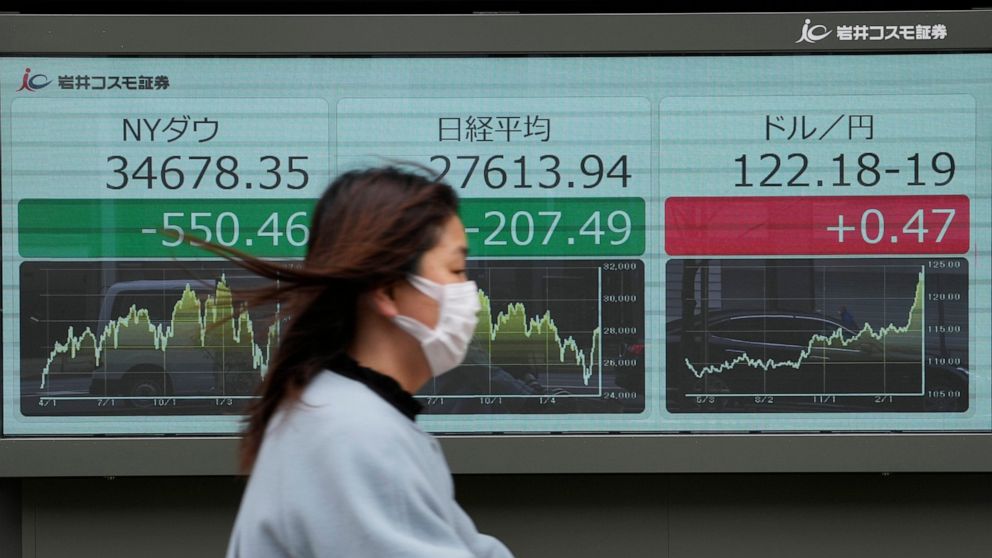Global shares mixed as Japan ‘tankan’ shows weaker outlook
Global shares are trading mixed as a resurgence of Russian attacks dashes hopes for any quick end to the war in Ukraine
TOKYO — Global shares were trading mixed Friday as a resurgence of Russian attacks dashed hopes for any quick end to the war in Ukraine.
France’s CAC 40 added nearly 0.2% in early trading to 6,670.87, while Germany’s DAX rose 0.2% to 14,439.41. Britain’s FTSE 100 gained 0.3% to 7,540.21. The futures for the Dow industrials and S&P 500 were 0.4% higher.
The Bank of Japan’s closely watched quarterly gauge of business sector sentiment, the “tankan,” showed the benchmark indicator for large manufacturers dropped for the first time in seven quarters, losing three points from a survey in December to 14 points from 17 points.
The war in Ukraine, coming on top of supply chain disruptions at top manufacturers caused by COVID-19 restrictions and growing worries about inflation, especially soaring energy costs, are clouding the outlook for already fragile growth in the world’s third-largest economy.
The war is the biggest single factor weighing on markets, analysts say. Ukrainian President Volodymyr Zelenskyy expressed pessimism about Russian intentions and said in his nightly video address to the nation that he expected the Russian offensive would continue for some time.
“As we head into the weekend break, optimism for a ceasefire in the geopolitical conflict continues to fade overnight,” said Yeap Jun Rong, market strategist at IG in Singapore.
Japan’s benchmark Nikkei 225 slipped 0.6% to finish at 27,665.98.
Shares in electronics and energy giant Toshiba Corp. jumped 6.5% on news that Bain Capital might make an offer to acquire the company and take it private. Toshiba said it was not involved in any such talks.
South Korea’s Kospi lost 0.7% to 2,739.85. Australia’s S&P/ASX 200 edged down less than 0.1% to 7,493.80. Hong Kong’s Hang Seng rose 0.2% to 22,039.55, while the Shanghai Composite jumped 0.9% to 3,282.72.
Rising COVID-19 cases in China are adding to the worries of a regional slowdown. The lockdown in Shanghai entered its second phase of extended restrictions, while restrictions were lifted in hard-hit Jilin.
Oil prices fell as President Joe Biden ordered the release of up to 1 million barrels of oil per day from the nation’s strategic petroleum reserve. The move to pump more oil into the market is part of an effort to control energy prices, which are up nearly 40% globally this year.
U.S. benchmark crude fell $1.08 to $99.20 a barrel in electronic trading on the New York Mercantile Exchange. It fell 7% on Thursday. Brent, the international pricing standard, shed 69 cents to $104.02 a barrel.
Russia’s invasion of Ukraine has elevated concerns that tightened supplies will only worsen persistently rising inflation that threatens businesses and consumers globally.
Thursday on Wall Street, the S&P 500 lost 1.6%. It’s down nearly 5% since the beginning of the year. The Dow Jones Industrial Average also fell 1.6%, while the Nasdaq composite shed 1.5%. The Russell 2000 index dropped 1% to 2,070.13.
Investors received a lukewarm update on the job market on Thursday. More Americans applied for unemployment benefits last week, but layoffs remain at historic lows. Wall Street will get a fuller report on Friday when the Labor Department releases employment data for March.
In currency trading, the U.S. dollar rose to 122.56 Japanese yen from 121.69 yen. The euro cost $1.1074, up from $1.1071.
———
AP Business Writers Damian J. Troise and Alex Veiga contributed.
![]()


